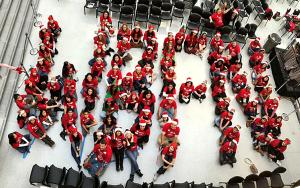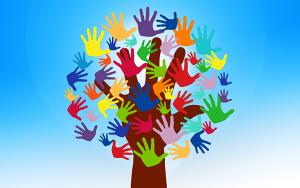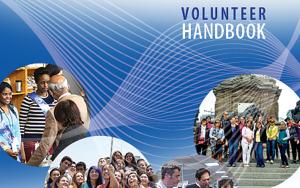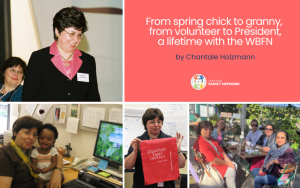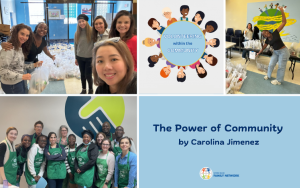
By Diana Mayer, LCMFT WBG FCS Counselor
Parenting is hard; but parenting multicultural children in a country you don’t know well adds another layer of difficulty. Raising children in a culture different than your own while helping them develop their own identity is immensely rewarding but also quite tough. Hopefully this article will help you sort through the challenges and reap the benefits.
Take some distance from current concerns such as adjusting to a totally different school system, navigating new cultural expectations and doing all of this without strong family support. Shift instead to long-term thinking; what would you like to see from your child in twenty years?
After years of asking this question at workshops and presentations (and wondering to myself what I want for my own multicultural children), the answer looks pretty much like this: “Parents want kids to be happy, surrounded by a family that grounds them; professionally successful and financially comfortable. They would like for them to be good leaders, help others in need and be proactive members of their community”.
The good news is that successfully raising multicultural children increases the chances of that happening. The key to success is finding a balance between developing a strong FAMILY CULTURAL IDENTITY and embracing DIVERSITY AND MULTICULTURALISM.
Family Cultural Identity (FCI) encompasses the values, rules and traditions that govern your family’s daily life and routines. It helps children understand the relationships around them to determine who they are as individuals and as members of a community. It connects them to their heritage and helps them identify with others who have the same traditions. All in all, FCI will provides your children with a sense of belonging.
Developing a strong FCI requires intentionality and persistence. Here are some How-To ideas:
- Stay connected to your extended family. If living abroad, use technology to incorporate grandparents and others into family routine (For example, ask grandparents to read a bedtime story through FaceTime).
- Consistently incorporate your country of origin’s food in your family’s diet.
- Listen, and dance, to your culture’s music. Make dancing at home a family tradition.
- Watch and support your country’s sports teams. Root for them and give team jerseys as gifts.
- Practice religious rituals. Religion and nationality intertwine to shape FCI. A short prayer embedded in bedtime routines, going to mass on Sundays, lighting Shabbat candles and celebrating Ramadan are all good examples.
- Have children attend and be a part of religious and/or language schools. This offers a double benefit: Learning and socializing with peers who will become your child’s support group.
- Always speak to them in your native language or “mother tongue”; they will organically learn the language of your host country. Maintaining their first language will require effort, consistency and fighting resistance. Don’t give up; the benefits of multilingualism are numerous and have been extensively researched. From healthier brain development and better attention span, to educational and workplace advantages, among others.
Research shows that children that grow with a strong FCI have better parental attachment, making them feel closer and connected, have superior reading and writing skills and better than average analytical, social and academic skills. They develop higher self-esteem and self-confidence, increase their career and professional prospects and decrease risk factors such as alcohol and substance use, teenage pregnancy and school absences.
But children with a rigid cultural identity might struggle to adjust to their new home country, school community and peer group. They might judge others harshly and have difficulty tolerating differences. In order to find a good balance, parents need to encourage children to explore and venture out of their comfort zone; you can do this by promoting diversity and multiculturalism.
Diversity and Multiculturalism (D&M) is defined as the co-existence of different cultures. A melting pot of interactions with people of different race, nationality, religion, sexual orientation, and ways of thinking. An extensive body of research shows that children raised in a tolerant multicultural environment become more mature than their peers, have better social skills, are more creative and “outside-the-box” thinkers. These super kids tend to be less judgmental and much more empathetic, more resilient and adaptable.
Here are some ideas of how to increase D&M:
- Encourage friendship and connection with peers of different backgrounds, religions and/or cultures.
- Attend and participate in events that showcase different countries and cultures, such as DC area schools’ International Nights and World Embassy Tour.
- Travel as much as possible; enjoy different flavors and learn by experiencing.
- Read with your children books that showcase characters that look different than yourself. Enjoy the stories of heroes with different skin color.
- Attend gatherings, marches and other social movements.
- Most importantly, lead by example. Be respectful and tolerant and show genuine interest in learning about others.
Finding a balance between FCI and D&M permits us to raise Super Kids, the ones that one day soon will make this world a better place. It is our responsibility as parents, not only because it will give them a leg up and ease success in their adulthood, but because the world needs Global Citizens. Citizens of the World are aware of the wider world and have a sense of their own role in it, respect and value diversity, are outraged by social injustice, participate in the community, are willing to act to make the world a more equitable place and take responsibility for their actions.
Achieving this balance is no easy task; parents might encounter their own resistance of immersing themselves in a new and little known cultural environment, learning new social norms and the ins-and-outs of the local school system. Parents might feel isolated, miss family and friends; have a hard time finding ingredients to cook meals that taste like home and might struggle with a language they don’t master. At the same time, children might resist practicing family traditions, maintaining their native language, may dislike attending religious or language school on the weekends, and might prefer to assimilate for fear of not fitting in.
Through WBFN, WBG has services to help ease the challenges of raising multicultural children because it understands the importance and complications of finding a needed balance. Short-term counseling support through the WBFN Family Consultation Services (FCS) Program (Tel: 202-458-5550) is available to family members over the age of eighteen. This is a way that parents can gain an understanding of what their children are experiencing growing up in a country different than their own, and can develop strategies for handling difficulties. FCS counselors can also work with parents to help them obtain relevant referral sources so that they can get any further help they need.
Raising a healthy multicultural family is challenging but possible. Thousands of World Bank families are doing it all around the world right now.

